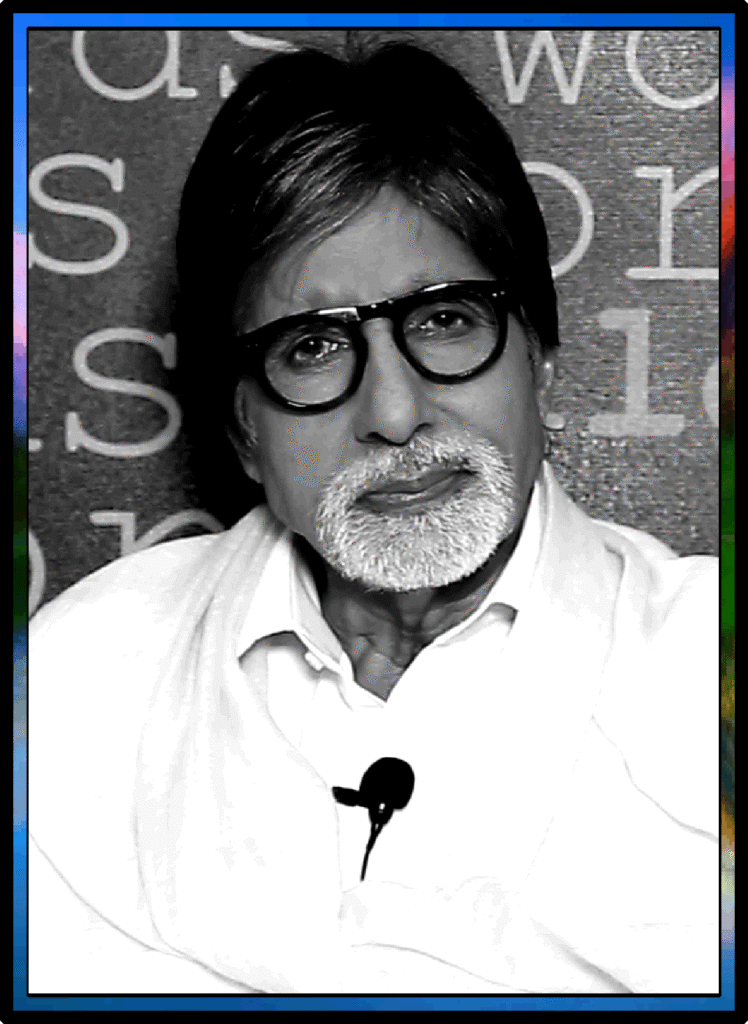Biography of Amitabh Bachchan
Early Life and Background
Amitabh Bachchan, fondly known as the Shahenshah (Emperor) of Bollywood, was born on October 11, 1942, in Allahabad—then part of the United Provinces under British India, now known as Prayagraj in Uttar Pradesh. He was born into a culturally rich family. His father, Harivansh Rai Bachchan, was a celebrated Hindi poet, while his mother, Teji Bachchan, was a passionate social activist. At birth, he was named Inquilaab Srivastava, inspired by the revolutionary slogan “Inquilab Zindabad” from India’s independence movement. However, it was his father who later renamed him Amitabh, meaning “the light that will never die”—a name that would go on to define his luminous legacy. The surname Bachchan wasn’t originally a family name. It was the literary pseudonym Harivansh Rai Bachchan adopted as a poet, and it eventually became the family’s official surname. (Amitabh Bachchan has a younger brother named Ajitabh Bachchan). Amitabh completed his schooling at Sherwood College in Nainital, where he stood out not only for his academic performance but also for his active participation in extracurricular activities.
Early Struggles and Entry into Films
Long before he became one of the most iconic figures in Indian cinema, Amitabh Bachchan had a very different dream—

he wanted to be a radio announcer. However, All India Radio turned him down, ironically because of the very thing that would later define his on-screen presence: his deep, commanding voice.
In the late 1960s, he moved to Bombay (now Mumbai) to pursue a career in films. At the time, his towering height and baritone voice were seen as unconventional and even considered disadvantages in the industry. But Amitabh was undeterred.
He began his journey in cinema in 1969, not as an actor but as a voice narrator in Mrinal Sen’s acclaimed film Bhuvan Shome. That same year, he landed his first acting role in Saat Hindustani, directed by Khwaja Ahmad Abbas. While the film didn’t perform well at the box office, Amitabh’s performance stood out. His talent was recognized early on, earning him the National Film Award for Best Newcomer.
This marked the beginning of an extraordinary career—one that would redefine Indian cinema and turn Amitabh Bachchan into a living legend.
“He was admired for his versatility, effortlessly moving between high-energy action roles and deeply emotional or romantic performances.”
Personal Life
Amitabh Bachchan, fondly known as “Amit Sir,” tied the knot with renowned Bollywood actress Jaya Bhaduri in 1973. Their union, celebrated both on and off the screen, has remained one of Bollywood’s most iconic partnerships.
The couple is blessed with two children. Their daughter, Shweta Bachchan Nanda, is a respected writer and entrepreneur, known for her elegance and presence in the literary and fashion worlds. Their son, Abhishek Bachchan, followed in his father’s footsteps and built a name for himself in the film industry. He is married to global icon and actress Aishwarya Rai Bachchan.
Despite living much of their life under the public spotlight—with constant media attention and speculation—Amitabh and Jaya’s marriage has endured through decades, standing strong as a testament to commitment, love, and mutual respect.
Rise to Stardom The Angry Young Man
A defining moment in Amitabh Bachchan’s career came in 1973 with the release of Zanjeer, directed by Prakash Mehra. In the role of a tough, brooding police officer, Bachchan shattered the traditional image of the Bollywood hero. His powerful portrayal of the “Angry Young Man” struck a deep chord with audiences, especially at a time when India was going through significant political and social unrest.
Zanjeer not only catapulted Amitabh into stardom but also marked the beginning of an extraordinary run at the box office. Over the next few years, he delivered one hit after another, cementing his status as a superstar. Some of his most iconic films from this golden era include:
Deewaar (1975)
Sholay (1975) – widely regarded as one of the greatest Indian films of all time
Kabhi Kabhie (1976)
Amar Akbar Anthony (1977)
Don (1978)
Muqaddar Ka Sikandar (1978)
Trishul (1978)
These films not only showcased his versatility as an actor but also built the foundation of a legacy that continues to inspire generations of actors and fans alike.
Accident and Near-Death Experience
n 1982, while shooting for the film Coolie, Amitabh Bachchan suffered a life-threatening intestinal injury during an action scene. The entire nation was gripped with worry, anxiously hoping for his recovery.


Second Innings in Cinema
After the phenomenal success of Kaun Banega Crorepati (KBC), Amitabh Bachchan began a remarkable second phase of his film career—redefining his image and embracing powerful, diverse roles. He returned to the silver screen with a renewed energy and delivered some of his most memorable performances.
In Mohabbatein (2000), he played a strict yet emotionally complex headmaster, marking his re-entry into mainstream cinema. His role in Black (2005), as a determined teacher to a deaf-blind girl, earned him widespread acclaim and multiple awards.
He continued to impress audiences with intense roles in Sarkar (2005) and its sequels, channeling a political patriarch with commanding presence.
In Paa (2009), he took on one of the most challenging roles of his career, portraying a child with progeria—a performance that was both touching and transformative.
Piku (2015) showcased his softer, quirky side as a hypochondriac father, winning both hearts and critical praise. Then came Pink (2016), a powerful social drama where his role as a retired lawyer championing women’s rights and the importance of consent resonated deeply with audiences.
Even well into his 70s and 80s, Amitabh Bachchan has shown no signs of slowing down, continuing to choose roles that challenge stereotypes and push boundaries.
Awards and Honors
Amitabh Bachchan’s contribution to Indian cinema is unparalleled, and his accolades reflect his extraordinary talent and enduring legacy.
National Film Awards: He has won 5 Best Actor awards, showcasing his versatility and depth across decades.
Filmfare Awards: With 15 wins and over 40 nominations, he remains one of the most celebrated figures at India’s premier film awards.
In 2019, he was honored with the Dadasaheb Phalke Award, India’s highest recognition in cinema.
The Government of India has bestowed upon him the Padma Shri (1984), Padma Bhushan (2001), and the Padma Vibhushan (2015)—among the nation’s top civilian honors.
In 2007, France awarded him the Legion of Honour, their highest civilian award, acknowledging his global influence in cinema.
In addition to these, he has received numerous honors from international film festivals, cultural organizations, and global institutions, further cementing his legacy as a cinematic icon.
Health Struggles and Miraculous Recovery
Amitabh Bachchan’s life took a dramatic turn when he faced a series of critical surgeries and spent months in recovery. His incredible comeback from the brink of death not only touched millions but also cemented his place as a living legend in Indian cinema.
Political Involvement
In 1984, Amitabh stepped into politics at the request of his close friend Rajiv Gandhi. He contested from Allahabad and won a seat in the 8th Lok Sabha. However, politics proved disheartening. Disillusioned by the system, he stepped down after just three years, famously describing politics as a “cesspool” he didn’t wish to be part of.
Career Slump and Triumphant Return
The late 1980s and early 1990s were a turbulent time in Amitabh’s career. A series of box-office flops and a temporary retirement made many believe his time in the spotlight was over. He tried his hand at business by launching Amitabh Bachchan Corporation Ltd. (ABCL) in 1996, but the venture struggled, leaving him in deep financial trouble.
But like a true hero of his own story, Amitabh made a remarkable comeback. In 2000, he took a leap of faith by hosting Kaun Banega Crorepati (KBC), the Indian adaptation of Who Wants to Be a Millionaire?. The show was an instant hit, reconnecting him with audiences young and old, and restoring his status as one of India’s most beloved icons.
Social Media and Digital Presence
Social Media and Online Presence
Amitabh Bachchan stays closely connected with his fans by actively engaging on social media platforms such as Twitter, Instagram, and Facebook. He shares his thoughts, reflections, and life experiences daily through his personal blog, offering a rare glimpse into his world—be it about cinema, philosophy, or personal memories.
Philanthropy and Social Causes
Beyond the silver screen, Amitabh Sir has consistently used his voice and influence to champion important causes. His philanthropic work includes:
Supporting health initiatives such as polio eradication, tuberculosis awareness, and education for the girl child.
“He has extended meaningful support to farmers by contributing to debt relief initiatives in Maharashtra and Uttar Pradesh.”
Actively donating to COVID-19 relief during the pandemic, helping communities in need.
Legacy and Influence
Amitabh Bachchan is not just a legendary actor—he is a cultural institution. With a career that spans decades, his iconic dialogues, powerful screen presence, and unmatched charisma have left a permanent imprint on Indian cinema. His influence cuts across generations, and he is widely regarded as one of the most significant and inspiring figures in the history of Indian film.


Conclusion
From facing early rejections—including being told his voice was unsuitable for radio—to becoming one of the most iconic and respected figures in Indian entertainment, Amitabh Bachchan’s journey is truly legendary. Over a remarkable career spanning more than five decades, he has not only redefined Indian cinema but has also adapted gracefully to its evolving landscape.
His story is one of resilience, reinvention, and an unwavering passion for the art of storytelling. Whether on screen or off it, his presence continues to command admiration and respect.
Even today, Amitabh Bachchan wears many hats—actor, television host, writer, and motivator—with effortless grace. His ability to stay relevant and inspiring across generations makes him more than just a superstar; he is a timeless symbol of excellence, humility, and dedication.
Truly, he is the Superstar of the Millennium—a title well earned and deeply felt.


Pingback: sildenafil citrate tablets ip 50 mg
https://bestcryptotradingplatformaustralia.com/